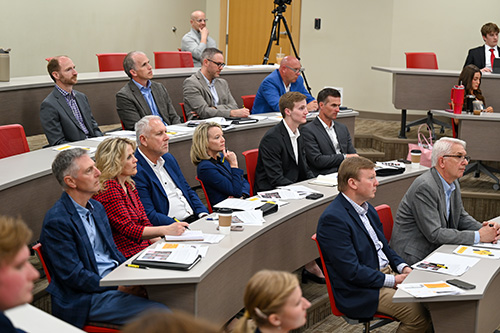As part of a yearlong capstone experience, 36 seniors in the Nebraska Business Honors Academy served as consultants for Cornhusker Bank, working on strategic business challenges. In the Honors Business Policies and Strategies (Management 475H) course, taught by Tammy Beck, associate professor of management, student teams delivered actionable recommendations to Cornhusker Bank’s executive leadership team.
“The talent in this group is just remarkable,” said John Dittman, executive chairman of Cornhusker Bank, after the six groups presented their recommendations. “You’re a blessed and impressive bunch. It’s been very beneficial for us to hear your ideas. I also want to wish all our seniors the very best in their careers and lives.”
 Several executive leaders from Cornhusker Bank attended class in May when the students shared their final presentations.
Several executive leaders from Cornhusker Bank attended class in May when the students shared their final presentations.
During the fall semester, students focused on management strategy in the classroom. In the spring, they apply their cumulative business knowledge to real-world problems for businesses and nonprofits.
“This course is about more than business strategy or strategic thinking,” said Beck. “It’s about learning how to apply your skills and collaborating with professionals to find viable solutions. It prepares students to think critically, communicate professionally and deliver impactful solutions.”
Covering topics from fraud prevention to lending and income diversification, the projects gave students insight into corporate decision-making and exposed them to executive-level operations. Working with Cornhusker Bank leaders like Allen Chaffee, chief banking officer, and Crystal Wichita, chief operations officer, students tackled some of the institution’s most pressing challenges.
Olivia Palmer, '25, management and marketing graduate from Omaha, Nebraska, who plans to pursue a Master of Education in higher education administration at the University of Kansas, said the experience pushed her team to learn new concepts.
“The biggest challenge for our team was learning the language surrounding lending and income diversification. Our team consisted of a wide variety of majors and different career interests, but none of us had a lot of experience in this realm of business,” Palmer said. “We challenged ourselves to learn and understand all the aspects of the problem we were trying to solve, so with the help of David Nuiser, chief lending officer, and Matt Brase, vice president-controller at Cornhusker Bank, and some research, we were able to learn so much about the business and banking world.”
Another team focused on combating financial fraud in an increasingly digital banking environment. Under the guidance of Perry Haralson, chief financial officer of Cornhusker Bank, students explored industry best practices and emerging fraud prevention technologies.
Baden Brumbaugh, '25, a senior economics major entering veterinary school in the fall, said their role was less about invention and more about curation.
“There’s a lot of pressure today to create something brand new, but what many companies really need is somebody who can sift through the endless options and find what will fit their needs the best. That idea is shared in the veterinary world as pet owners have hundreds of options for what to feed their animals. Should they prioritize cost, health, flavor, etc.? All they want is somebody to say, 'Feed your pet this.' The idea of organizing what’s already available for my clients seems much more realistic than creating something they have never seen before,” he said.
For many students, the most meaningful part of the experience was engaging in conversations, receiving constructive feedback and building relationships with Cornhusker Bank’s executive team.
“Cornhusker Bank really valued our input and findings, which made all of our work worth it. Our impact as students mattered,” said Palmer.
Barry Lockard, president and chief executive officer of Cornhusker Bank, praised the students' thoughtful work and contributions.
“It was awesome to listen to your presentations and see the work that went into them. Your red shines a lot brighter—and differently—when you step up like this,” Lockard said.
After the presentations, students left with more than academic credit. Brumbaugh noted the confidence in their capabilities and excitement for what lies ahead.
“This capstone course experience is meant to be the execution of what all of us have been working for the past four years—to show a real company that we are capable, hirable individuals the day we cross the commencement stage,” said Brumbaugh, who is from Bellevue, Nebraska. “The feedback from Cornhusker Bank showed me that we have what it takes as Nebraska Business Honors Academy students to jump right into the workforce and keep challenging ourselves in the future.”
Published: June 12, 2025